Italian and Swiss expedition
The Italian and Swiss expeditions of 1799 and 1800 were undertaken by a combined Austro-Russian army under overall command of the Russian General Alexander Suvorov against French forces in Piedmont, Lombardy and Switzerland as part of the Italian campaigns of the French Revolutionary Wars in general and the War of the Second Coalition in particular.

Italian campaign
Although by 1799 he was nearly seventy years old, Suvorov was one of the most competent and experienced commanders of the age. He had won no fewer than sixty-three battles in the course of his long military career and had been appointed field marshal during the reign of Catherine the Great, though he was dismissed by Tsar Paul, her son and successor, after the old soldier had the audacity to criticise the new imperial Infantry Code. He was only recalled after the Austrians specifically requested that he be appointed to command the combined Austro-Russian army to fight the French in Italy.
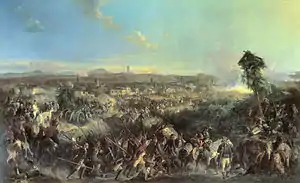
Taking command on 19 April, Suvorov moved his army westwards in a rapid march towards the Adda River; covering over 480 kilometres (300 mi) in just eighteen days. On 27 April, he defeated Jean Victor Moreau at the Battle of Cassano. Soon afterward, Suvorov wrote to a Russian diplomat: "The Adda is a Rubicon, and we crossed it over the bodies of our enemies."[1] On 29 April he entered Milan. Two weeks later, he moved on to Turin, having defeated Moreau yet again at Marengo. The king of Sardinia greeted him as a hero and conferred on him the rank of "Prince of the House of Savoy", among other honors.
From Naples, General MacDonald moved north to assist Moreau in June. Trapped between two armies, Suvorov took the bold decision to concentrate his whole force against MacDonald, beating the French at the Trebbia River, close to the spot of Hannibal's great victory in 218 BC. Marching back to the north, the indomitable soldier chased the whole French Army of Italy back towards the Riviera, taking the powerful fortress of Mantua on 28 July.
Moreau was relieved of command, to be replaced by Joubert. Pushing through the Bocchetta Pass, Joubert was defeated and killed in battle with Suvorov at Novi to the north of Genoa. Years later when Moreau, who was also present at Novi, was asked about Suvorov, he replied "What can you say of a general so resolute to a superhuman degree, and who would perish himself and let his army perish to the last man rather than retreat a single pace."[2]
Swiss campaign

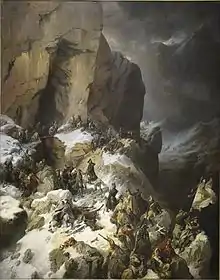
In 1798, Paul I gave General Korsakov command of an expeditionary force of 30,000 men sent to Germany to join Austria in the fight against the French Republic. At the beginning of 1799, the force was diverted to drive the French out of Switzerland. Leaving Russia in May, Korsakov reached Stockach in 90 days. With 29,463 men, his command then marched to Zürich to join up with the 25,000-man corps of Austrian general Friedrich von Hotze, who had defeated the French army at the Battle of Winterthur on 27 May 1799. It was expected that Alexander Suvorov's army would join them from Italy after marching through the Alps, but terrain and enemy action held up Suvorov's advance. In the meantime, Korsakov waited near Zurich in a relaxed state of over-confidence.[3] Taking full advantage of this, the French under André Masséna attacked on 25 September 1799, in the Second Battle of Zürich, winning a signal victory and forcing Korsakov to withdraw rapidly to Schaffhausen, despite almost no pursuit by the French and orders from Suvorov for him to hold his ground. Korsakov then took up a position on the east of the Rhine in the Dörflingen Camp between Schaffhausen and Constance, remaining there while Masséna was left free to deal with Suvorov. His left under Condé was driven from Constance on 7 October, on the same day he advanced from Büsingen against Schlatt, but was eventually driven back by Masséna, abandoning his hold on the left bank of the Rhine. He joined Suvorov's survivors at Lindau on 18 October, and was shortly after relieved of command.
Outcome
Although he succeeded in rescuing his army and did not lose a single battle, Suvorov's spectacular manoeuvring in Italy and Switzerland proved altogether useless. He was promoted to the rank of Generalissimo, the fourth in all of Russian history, and was recalled to Saint Petersburg by the Emperor Paul.
It was as a consequence of this campaign that Suvorov wrote Rules for the Conduct of Military Actions in the Mountains. He died in May 1800, having never fulfilled his greatest ambition – to meet Napoleon on the battlefield. A detailed account of the campaign was published in five volumes by Dmitry Milyutin in 1852–53.
Suvorov remains vividly remembered in the parts of the Swiss Alps his army passed through. Even though his famished troops plundered the countryside bare and his campaign was ultimately fruitless, the general is venerated as a liberator from the occupying French. Plaques adorn nearly every spot where he ate or slept in the Alps; chairs and beds he used are preserved as exhibits.[4] A life-size equestrian statue was unveiled in 1999 on the St. Gotthard Pass.
 Suvorov victorious at the Battle of Trebbia. Alexander von Kotzebue, 1889.
Suvorov victorious at the Battle of Trebbia. Alexander von Kotzebue, 1889.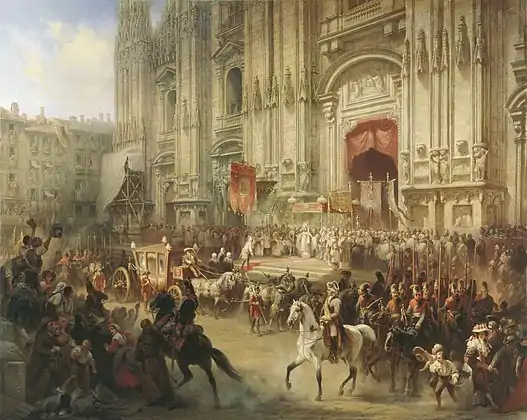 Suvorov in Milan. Adolf Charlemagne (d. 1901).
Suvorov in Milan. Adolf Charlemagne (d. 1901). Suvorov at the St. Gotthard Pass. Adolf Charlemagne (d. 1901).
Suvorov at the St. Gotthard Pass. Adolf Charlemagne (d. 1901). Suvorov Crossing the Devil's Bridge. Robert Porter (d. 1842).
Suvorov Crossing the Devil's Bridge. Robert Porter (d. 1842)..jpg.webp) Suvorov's March across the Alps (1904 mosaic from the Suvorov Museum).
Suvorov's March across the Alps (1904 mosaic from the Suvorov Museum).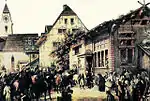 Suvorov Bidding Farewell to the Swiss People. Andrey Popov (d. 1896).
Suvorov Bidding Farewell to the Swiss People. Andrey Popov (d. 1896).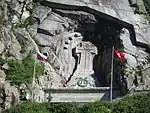 Monument to Alexander Suvorov and his fallen soldiers next to the Devil's Bridge, 1899.
Monument to Alexander Suvorov and his fallen soldiers next to the Devil's Bridge, 1899. 1999 statue on the St. Gotthard Pass on 2016 postage stamp of Russia
1999 statue on the St. Gotthard Pass on 2016 postage stamp of Russia
Notes
- Latimer, 65
- Latimer, 68
- Furse, George Armand Marengo and Hohenlinden (2 vols 1903, facsimile edition Worley 1993 p.80)
- Nussbaumer, Hannes. "Wie ein russischer General zum schweizerischen Volkshelden wurde ('How A Russian General Became A Swiss Folk Hero)". Berner Zeitung (in German). Retrieved 19 September 2009.
References
- Clausewitz, Carl von (1834). Hinterlassene Werke des Generals Carl von Clausewitz über Krieg und Kriegführung, zweiter teil : Die Feldzüge von 1799 in Italien und der Schweiz (in German). Berlin: F.Dümmler. OCLC 19596006.
- Clausewitz, Carl von. Napoleon Absent, Coalition Ascendant: The 1799 Campaign in Italy and Switzerland, Volume 1. Trans and ed. Nicholas Murray and Christopher Pringle. Lawrence, Kansas: University Press of Kansas (2020). ISBN 978-0-7006-3025-7
- Dmitry Milyutin. The History of the War of Russia with France during the Reign of Emperor Paul I, vol. 1–9. St. Petersburg, 1852–1853.
- Latimer, Jon (December 1999). "War of the Second Coalition". Military History: 62–69.
- Longworth, Philip (1965). The Art of Victory: The Life and Achievements of Generalissimo Suvorov (1729–1800). New York: Holt, Rhinehart & Winston. OCLC 7139853.